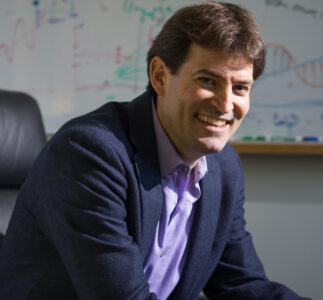
Multidimensional Risk in a Nonstationary Climate: Changes in Joint Probability of Extreme Conditions in Space and Time
This event has passed. See the seminar recording here:
Prof. Noah Diffenbaugh
Kara J Foundation Professor and Kimmelman Family Senior Fellow
Stanford University
Monday April 12, 2021, 2 PM EST
Abstract:
As has been made acutely clear in recent years, many natural and human systems are particularly prone to the co-occurrence of extremes like severe heat, heavy rainfall, storm-surge flooding, severe drought, and extreme wildfire conditions. The co-occurrence of these conditions, both simultaneously (or in rapid succession) in a given location or in different parts of the world, is critical for a broad suite of climate-sensitive concerns, including agricultural markets, food security, poverty vulnerability, supply chains, weather-related insurance and reinsurance, and disaster preparedness and recovery – particularly when those conditions are sufficiently extreme to fall outside of historical experience. This seminar will summarize recent work quantifying changes in the frequency of unprecedented events without consideration for joint probability, and then present a framework for quantifying the spatial and temporal co-occurrence of climate stresses in a nonstationary climate. This framework shows that, globally, anthropogenic climate forcing has doubled the joint probability of years that are both warm and dry in the same location (relative to the 1961–1990 baseline). In addition, the joint probability that key crop and pasture regions simultaneously experience severely warm conditions in conjunction with dry years has also increased, including high statistical confidence that human influence has increased the probability of previously unprecedented co-occurring combinations. The potential for this methodology to lend insight for other sectors that are accustomed to deploying resources based on historical probabilities, such as wildfire risk management, will also be discussed.
Biosketch:
Dr. Noah Diffenbaugh is the Kara J Foundation Professor and Kimmelman Family Senior Fellow at Stanford University. He studies the climate system, including the processes by which climate change could impact agriculture, water resources, and human health. Dr. Diffenbaugh has served the scholarly community in a number of roles, including as a current Editor of the peer-review journal Earth’s Future, and as Editor-in-Chief of the peer-review journal Geophysical Research Letters from 2014-2018. He has also served as a Lead Author for the Intergovernmental Panel on Climate Change (IPCC), and has provided testimony and scientific expertise to Federal, State and local officials. Dr. Diffenbaugh is an elected Fellow of the American Geophysical Union (AGU), and is a recipient of the James R. Holton Award and William Kaula Award from the AGU, and a CAREER award from the National Science Foundation. He has been recognized as a Kavli Fellow by the U.S. National Academy of Sciences, and as a Google Science Communication Fellow.
Webinar:
Webinar thread: https://go.umd.edu/diffenbaughwebinar
Event site: https://go.umd.edu/diffenbaugh
Webinar number: 120 303 8276
Webinar password: essic
To join the audio conference only:
US Toll: 1-415-655-0002
Global call-in numbers
For IT assistance:
Cazzy Medley: cazzy@umd.edu
Travis Swaim: tswaim1@umd.edu
Resources:
Seminar schedule & archive: https://go.umd.edu/essicseminar
Seminar Google calendar: https://go.umd.edu/essicseminarcalendar
Seminar recordings on Youtube: https://www.youtube.com/user/ESSICUMD

